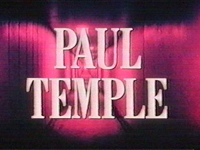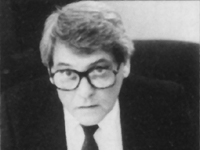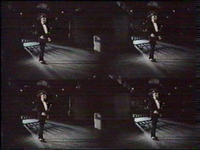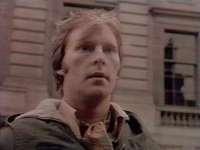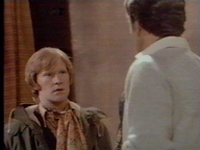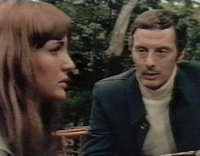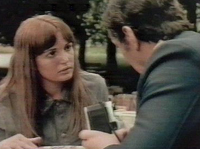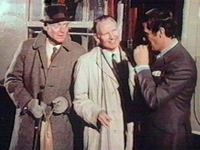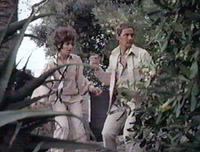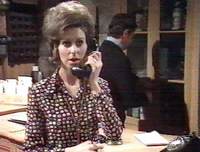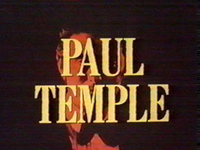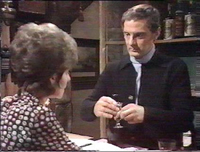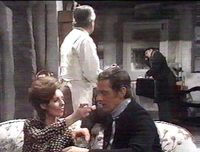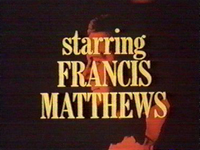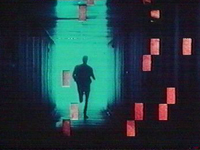PAUL TEMPLE (RTS version)
Pic: pts2c_RTS.jpg
After 30 years of Paul Temple radio shows Francis Durbridge succeeded in introducing his character to the TV screen. The resulting series made it to 52 episodes, shot between 1969 and 1971, and recently became the object of a hatchet job by Robert Banks Stewart who called it "humdrum stuff" when interviewed for the Shoestring website. True, the BBC series created by Stewart WERE different, but it does not seem fair to compare an early 1970s videotaped show to late 1970s, let alone a 1980s, filmed series. Temple, as we shall see, does have its merits and points of interest.
Paul Temple is a writer of detective novels and an amateur sleuth, invariably accompanied by his wife Steve, and always finding himself in all kinds of adventurous and hazardous situations – it is worth noting that some of the episodes (Games People Play, Death of Fasching) are by no means conventional mysteries.
Leading man Francis Matthews (*1927) claimed in an interview conducted by journalist Adam Jezard in 1995 that Durbridge himself wanted to see him in the starring role.
I had done two of his [Durbridge’s] TV serials, My Friend Charles and The World of Tim Frazer, with Jack Hedley (...) [B]y this time I knew Francis very well, Francis Durbridge rang when Paul Temple was being cast [and] simply offered me the job. (...) Francis, when he rang me up, said; ‘I’ve always had you in mind. If we were going to put Temple on the screen, I’d like you to do it.’
Matthews had previously appeared in The Revenge of Frankenstein, Dracula: Prince of Darkness, and Rasputin: The Mad Monk. In 1986 he re-joined the BBC for Brat Farrar. Paul Temple was produced by three BBC stalwarts whose back catalogue included other Durbridge projects and Doctor Who respectively.
Derrick Sherwin
(Modified scan from The Frame magazine, Special Issue on Douglas Camfield)
Pic: Alan Bromly
Alan Bromly had produced and directed many Durbridge serials, The Desperate People, Melissa, Bat Out of Hell (starring John Thaw), to name but a few, which made him an obvious choice. Peter Bryant had been a Doctor Who producer and story editor between 1966 and 1969. Derrick Sherwin had had a stint as Doctor Who story editor and producer between 1967 and 1970). Directors of that show who were invited to work on Temple were Douglas Camfield, George Spenton-Foster, Christopher Barry, Darrol Blake, and David Maloney. Writers included Dennis Spooner, Michael J. Bird, Cyril (The Onedin Line) Abraham, and David Whitaker.
This seems like a selection of the best talent available, but according to Matthews they were really good in the last season only. Durbridge, however, wrote none of the teleplays himself. It may be subject to debate whether that is really a disadvantage. Certainly many viewers missed the master's touch and his famous cliffhanger situations. On the other hand several renowned TV series writers used the opportunity of an "open" format to engage in all kinds of dramatic experiments. When the series was first broadcast in Britain an irate Radio Times reader brought forward criticism along these lines. Bryant's reply, printed in the same issue, was as follows:
"It would be a herculean and totally impossible task for any one person to write every episode of a weekly series. This is particularly so in the case of Francis Durbridge, who naturally is always very much in demand as a writer and, therefore, very heavily committed. That is why, with his blessing, we commission other writers. But (...) far from being 'unknowns', the writers we employ for the series are of a very high professional standard."
It would have been interesting, though, to see Durbridge himself handling a one-hour format.
Pic: forged_RTS.jpg (Caption: Lost: The Man Who Forged Real Money)
When we see the episodes today our verdict must be that many, though not all, have aged surprisingly well. Not only do they profit from the chemistry between Matthews and Ros Drinkwater (who plays Steve), but also from considerable achievements by the crew. A good example is Philip Dudley's handling of Games People Play, an episode which benefits to no small degree from the fact that the action is set on Malta and that it was made entirely on film. Co-producer Bryant compared this story to Fellini's classic, La Dolce Vita. George Spenton-Foster's direction of The Quick and the Dead, supported by Graham Oakley's splendid design, has a very nice gothic horror flair and can thus be regarded as a predecessor to his excellent Doctor Who segment Image of the Fendahl. In contrast to that Sherwin's Right Villain script is quite devoid of anything which does not seem clichéd today (see below).
Pic: games_RTS.jpg (caption: Games People Play)
Pic: quick2_RTS.jpg (Caption: The Quick and the Dead)
Approached from a technical viewpoint the 52 episodes had different formats. Diametrically opposed to Games People Play are Motel and Cue Murder!, since these episodes consist of videotaped material only. The exteriors of The Quick and the Dead were filmed by an O.B. unit. Most episodes were videotaped with filmed inserts. In the case of Corrida this traditional BBC method leads to what looks like a production fault when reaction shots of the actor playing the farmer made in the studio are crosscut with the exterior explosion sequences. It seems it was considered superfluous to hire the actor for two short location scenes. This may have been deliberate shooting policy but it does look odd because these are the first videotaped scenes after several minutes of film. Similarly, large chunks of Ricochet consist of footage made on location in the ski resort St Moritz. Intercut scenes with the leads obviously made in the studio look cheap and nasty.
The excellent and memorable title music is courtesy of Ron Grainer (Doctor Who, Tales of the Unexpected). In Alan Bromly's words, "It's what the Germans call an 'ear-worm' – it really grows on you." Grainer's theme music exists in two versions. The up-tempo one introduced the early episodes (as Games People Play shows), the slow one accompanied the end credits (later the same principle was applied to The Sweeney and The Chinese Detective, with a greater effect). As Corrida and other season 3 and 4 episodes prove the slow version was used for both main titles and end credits of the last 26 instalments. According to a Radio Times article the season 1 episode Missing Penny featured a two-minute version of the up-tempo theme.
From season 2 onwards the German company Taurus Film from Munich acted as co-producer. The end credits of the English versions mention Taurus explicitly, whereas the German versions credit ZDF television, one of the public TV networks, as co-producer. On the importance of the German contribution Matthews, when interviewed in 1995, had this to say:
[The Germans] insisted I got into a Rolls-Royce and look as if I was wealthy, and drive myself. And also that I was occasionally allowed to hit people and get angry. But the BBC had decided that I was going to be very quiet and urbane. I think the Germans made the show better.
Peter Bryant told Radio Times (3/4/1970):
The main reason we've been able to do so much filming abroad is that this series is a co-production with Taurus films (...) They wanted to come in with us because Francis Durbridge is fantastically popular in Germany. And we were delighted to let them, because it gives us much more scope to work abroad. (...) When he [Temple] does hit someone, he gets his knuckles cut and it hurts. I think the appeal of the character today – and remember that he belongs originally to the 30s – is that he is an amateur.
In yet another Radio Times statement Bryant and Sherwin seemed enthusiastic with regard to season 2 (which was their debut in the driver's seat). Temple would become "more international, more glamorous – in quotes – and more action packed". The co-production deal led to the hiring of German guest actors and to German locations being used as settings (Murder in Munich, Death of Fasching, A Family Affair). Other locations – apart from Malta – included Amsterdam (Antique Death), Bruges, and Italy.
Pic: munich_RTS.jpg (Caption: Lost: Murder in Munich)
During season 1 the Temples had confined their sleuthing to the UK, Steve acting as Paul's driver. Their sidekicks were elderly Kate (June Ellis) and Eric (Blake Butler). Sadly all episodes of this series were junked by the BBC (see below). In season two Kate appeared only sporadically, Eric was omitted altogether. This vacancy was filled by Sammy Carson (George Sewell), an ex-convict going straight, and his man friday Paddy (Derek Martin).
Season 2 is a mixed affair, Right Villain being an example of how dated Temple looks occasionally. No surprises here, the whole plot is clear after a couple of minutes. It is remarkable only in the sense that it introduces Sewell's character.
Pic: rightvillain_RTS.jpg (caption: Lost: Right Villain)
DOUBLE VISION
A similar criticism is applicable to Double Vision because of its hesitant, old-fashioned treatment of drug addiction. Games People Play was mentioned already – this episode may be the best of the lot. Steal a Little Happiness, once again directed by Philip Dudley, paves the way for similar stories focusing on streetwise kids which were to become popular in the United States (cf. McCloud, Starsky & Hutch). Due to its melodramatic, but overall pessimistic structure it makes more of an impression than its overly sentimental American counterparts. Murder in Munich is satisfactory routine although one would have expected a little more from a two-parter - a higher percentage of location footage for instance.
STEAL A LITTLE HAPPINESS
Robert Urquhart, Gerald Sim, Francis Matthews in NIGHT TRAIN
The treatment of both pornographic magazines and homosexuality in third season's Night Train appears to be immature and sensationalistic, rather surprisingly so if we consider that this one was scripted by Michael J Bird (see elsewhere in this volume). On a better note, boundaries of time and space play an important role when Temple tries to recover stolen property whilst travelling to Inverness. Steve doesn't take part, she just rests or sleeps throughout. Paul doesn't bother to follow the case until the very end, leaving the less interesting legwork to the police. The ending is "open" and leaves you with a gasp.
A Greek Tragedy is a promising title, and indeed the viewer is in for a special treat. This is another episode which takes advantage of limitations of time and space, detailing how the Temples, stranded with their car in an isolated village, witness the impact of World War II and the German occupation of Greece on the present. Motel and Cue Murder! work similarly, the latter being set in a TV studio and dealing with spectacular events both in front of and behind the camera as a True Crime show is recorded live. Other episodes like Corrida, The Specialists and Has Anybody Here Seen Kelly? are average but none of them really disappoints, so all in all the third season is an improvement compared to the second.
The last season opener is probably not to everybody's taste. Paper Chase is a full-fledged parody, and writer Jeremy Burnham certainly seems more at ease here (Double Vision was penned by him as well). Most of Ricochet (except for the backprojections) is well executed technically: its exterior ski resort scenes do not fail to impress, and Paul getting involved in an extended punch-up is a rare sight. The Quick and the Dead was mentioned already, but the outstanding segment has to be The Guilty Must Die, formidably played by Patrick Mower, Sylvia Sims and Joe Melia, with Matthews and Drinkwater changing their traditional dramatic roles. It is cleverly written, and Douglas Camfield is the director – need we say more? The final episode, Critics, is based on a ludicrous premise but goes on to offer an interesting view of hippie culture. I'm not totally sure (yet) about its ideological implications, since there is only a dubbed version at my disposal at the moment. As far as the material currently available for reviewing is concerned, the quality standards set by the third season were upheld for the final one.
Pic: guilty_RTS.jpg (Caption: The Guilty Must Die)
According to Matthews the co-producers did not only exercise influence in the pre-production phase, but also intervened considerably in the post-production:
[The Germans] rewrote the stories ... because some of the stories were so dreadful, some of the dialogue so terrible, they even changed the dialogue and changed the stories to fit the pictures and made them even more gutsy and exciting. (Interview by A. Jezard, 1995)
That means the "German" episodes are not necessarily what British audiences saw in the early 1970s. To what extent Matthews is right remains to be seen: As of now, only the two Ricochet versions are available for comparison. Apparently nothing in the story was changed. A list of different scenes follows:
- The GERMAN version contains an additional establishing shot (Paul and Steve drive up to their hotel) which is missing from the UKG version.
- The GERMAN version contains a punch-up between Paul and Il Muto which is terminated by Angelo. The UKG version fades out after Paul's entry into Bernhard's hut. Their dialogue is taken up after that.
Pic: ricochet_RTS.jpg (Caption: Edited: Ricochet)
- (The same scene, continued) The UKG version contains a dialogue in which Bernhard and Paul discuss the nature of avalanches (sic).
- In the UKG version the dialogue between Dermott and his father is a little longer.
- The GERMAN version contains additional scenes in which Il Muto threatens Heidi with a knife (when she interrupts the theft of the cup). A heated verbal exchange between Heidi and Angelo follows which is also missing from the UKG version.
- The GERMAN version shows how Angelo "activates" his switchblade knife after receiving it from Il Muto, in order to attack Heidi.
- The GERMAN version contains a single shot of Heidi lying on the floor.
- The UKG version lists nine guest stars and supporting actors, the GERMAN version leaves out the last two. The GERMAN credits include Hugh Miles as 2nd cameraman.
Actually this list tells us more about UK Gold than about non-domestic versions!
With regard to audience response Matthews expressed the view that the series was very popular with the viewing public:
It made more money abroad and drew bigger audiences than The Forsyte Saga. It really was, at the time, the biggest thing, certainly in Europe, and in Australia and places like that (...) It was a huge hit, but the BBC has always been ashamed of it and they never mention it. (Interview by A. Jezard, 1995)
He pointed out that the relationship between Paul and Steve had both role models and imitators.
In fact, what the Americans did when they were offered it – because they [the BBC] wanted America to take it, because it would have been enormously successful for the BBC. The American’s turned it down, said it was too English, too parochial, and then went ahead and did a thing called McMillan and Wife with Rock Hudson and this girl (Susan St James) who was exactly like our girl. (...) [Y]ears later they did another version called Hart to Hart which was exactly the same (...). So they copied us, without giving any credit to Francis Durbridge, of course. But then Francis Durbridge copied The Thin Man, you know the married couple, William Powell and Myrna Loy. (Interview by A. Jezard, 1995)
For obvious reasons (year of production, the protagonist is a writer-cum-detective) Temple must be compared to ITC's Jason King. Many would claim that Temple is low-budget and more tedious than its boisterous counterpart. Such a judgment would not be entirely fair, though, since there are generic differences despite the obvious similarities. As James Chapman has shown, King is a parody, a permanent playful handling of crime drama conventions, a refusal to take anything seriously, whilst at the same time appealing – just like Ian Fleming's Bond fantasies – to the desires of the average male viewer. Characterized by material wealth and an affluent lifestyle King as a character is an adequate reflection of early 1970s zeitgeist.
Temple, on the other hand, comes across as almost ordinary, light-hearted, solid, non-promiscuous. He is wealthy, too, though far from eccentric and narcissistic. Eventually it is obvious that the character has its roots in the gentleman detective conceived in the 1930s. The crucial question is, how consistent was Temple transferred into Swinging Sixties and Roaring Seventies? Are differences in fashion, a few ounces of (crime-related) pot, and a limited dose of postmodernism (cf. Night Train) really sufficient, bearing in mind that with regard to the latter Jason King is much more pronounced? Reviewers who classify Temple as a rather half-hearted enterprise may have a point here.
The friendly words Matthews finds for the German co-producers already indicate that conflicts between them and the BBC had to lead almost inevitably to termination of the production. For example there were, from the outset, different attitudes towards "our girl":
That was one of the problems as well, that the BBC didn’t like her and the Germans did. They wanted to get rid of her and the Germans refused. (...) For reasons they will never explain to me, and nobody will tell, they stopped the show. It was something to do with the financial involvement of the German company which was publicising it all over Munich. I mean they had huge colour hoardings all over Munich saying: ‘Paul Temple, every Thursday’ and 25 million viewers – 25 million! – watched it in Germany every week. But for some reason the BBC cut it off. Huw Wheldon [BBC Managing Director 1969-75 and responsible for budgets and programmes] said: ‘Oh, I’m fed up with these bloody Germans giving us so many problems. You know they want a lot of colour photographs and publicity. That’s Lew Grade, that’s not the BBC. They want us to be like Lew Grade, we can’t have that!’ (Interview by A. Jezard, 1995)
Pic: endcredits_RTS.jpg
A more balanced source which could shed some light on the positions of Wheldon (interestingly, in his book Inside the BBC Leonard Miall recounts a dinner party anecdote in which Wheldon puts a ZDF representative in an embarassing situation) and Taurus respectively is not available at present. My thanks go to Mr Wynn Wheldon, though, for making the following point:
"(...) Paul Temple, although quite obviously rather second-rate drama, was actually quite good television, and much enjoyed in the Wheldon household, especially by my grandmother (my mother's mother) - whose opinion on these matters was treated as gospel by my father. As for "bloody Germans" - this came, of course, from the war. Among other experiences, he arrived at Belsen the day after it had been "liberated". Actually he had been in Germany immediately before the war, in Soest, memories of which were good enough to prompt him to return not long before he died. He knew quite a lot of Rilke off by heart. So the relationship was complex (...)"
Matthews maintains the BBC declined an immense financial gain – in contrast to the co-producers:
[T]he Germans helped to finance the international market. Then, when the BBC said they were not going to do anymore, the BBC sold them. The head of series told me ‘We’ve sold the lot for 650,000 pounds’. The Germans dubbed them into German, dubbed them into Swedish, dubbed them into French, dubbed them into... and sold them all over the world and made about a seven-million pounds profit, which the BBC could have had, but the BBC said ‘Oh, what!’ (Interview by A. Jezard, 1995)
Pic: greek_RTS.jpg (Caption: Lost: A Greek Tragedy)
According to Matthews the BBC even handed masters (!) over to the co-producers:
I think they have an archive of about 10 episodes left out of 52. The rest of them they gave to the Germans. The Germans bought the whole lot. (Interview by A. Jezard, 1995)
In his book Crime TV Martin Compart claims that Paul Temple was made for 630, 000 pounds Sterling and, therefore, very expensive at the time. Exorbitant costs, of course, would have been a good reason for Wheldon to put an end to Paul Temple.
Pic: paperchase_RTS.jpg (Caption: Lost: Paper Chase)
Indeed the BBC only store 16 episodes today. There were two BBC repeat runs intermingled with the first transmission in 1971 (The Artnappers, Double Vision). 11 (see table for an overview of the surviving formats) were shown on UK Gold in the mid 1990s, 5 were retrieved from New Zealand. Since this country had received black-and-white copies in the first place this is how they survive.
| GAMES PEOPLE PLAY |
C1 (=16mm colour film) |
| CORRIDA |
D3 (=Digital videotape) |
| THE SPECIALISTS |
D3 |
| HAS ANYBODY HERE SEEN KELLY? |
D3 |
| MOTEL |
D3 |
| CUE MURDER! |
D3 |
| DEATH OF FASCHING |
D3 |
| CATCH YOUR DEATH |
D3 |
| RICOCHET |
D3 |
| WITH FRIENDS LIKE YOU, WHO NEEDS ENEMIES? |
D3 |
| THE QUICK AND THE DEAD |
D3 |
| THE GUILTY MUST DIE |
R1 (=16mm b/w film recording of orig. videotape) |
| GAME, SET AND MATCH |
R1 |
| LONG RIDE TO RED GAP |
R1 |
| WINNER TAKES ALL |
R1 |
| CRITCS, YES! |
R1 |
Pic: catch2q5_RTS.jpg (Caption: Catch Your Death)
According to the BBC most of the original series 2 to 4 are held by the BetaFilm archive near Munich (BetaFilm belongs to the KirchMedia conglomerate and is the legal successor to Taurus Film). Their rights have expired but they are still entitled to keeping the material. After several months of prodding (including e-mails, letters and phone-calls) by this reviewer a list of available episodes was eventually sent to the BBC's Information and Archives department who are currently checking whether they are able to cover the transfer costs of 5000 Euros approx. per episode.
ZDF hold all 39 German dubbed episodes in colour telerecording format. Timecoded copies of 17 episodes archived on back-up viewing tapes can be ordered for private, non-commercial purposes. It was confirmed that no English language versions exist in the ZDF archive.
Author's note: My thanks go to Ian Beard, Adam Jezard and Gregory Marshall for directing my attention to a series whose existence was completely unknown to me until one year ago.
PAUL TEMPLE EPISODE GUIDE
Season 1
(1.01) Who Dies Next tx 23.11.69 Guest Stars Bernard Archard Olaf Pooley Ian Fairbairn Writer Peter Miller Designer Colin Shaw Director Douglas Camfield
(1.02) Message from a Dead Man tx 30.11.69 Guest Stars Madge Ryan Derek Benfield Writer John Roddick Designer Stanley Morris Director Paul Ciappessoni
(1.03) There Must Be a Mr X tx 07.12.69 Guest Stars Geoffrey Palmer Walter Gotell Writer David Ellis Designer Martin Collins Director Eric Hills
(1.04) Missing Penny tx 14.12.69 Guest Stars Martin Jarvis Gwen Cherrell Writer Cyril Abraham Designer Martin Johnson Director Tina Wakerell
(1.05) The Man Who Wasn't There tx 21.12.69 Guest Stars Lillias Walker Catherine Lacey Alethea Charlton Clifford Earl Writer John Tully Designer Roy Oxley Director Douglas Camfield
(1.06) Which One of Us Is Me? tx 28.12.69 Guest Stars Glyn Houston Barbara Shelley Milton Johns Prentis Hancock Writer David Chantler Designer Stanley Morris Director Paul Ciappessoni
(1.07) Inside Information tx 04.01.70 Guest Stars Tracy Reed Patricia Maynard Michael Gwynn Writer David Ellis Designer Martin Johnson Director Tina Wakerell
(1.08) The Masked Lady tx 11.01.70 Guest Stars Clive Morton Beatrix Lehmann Basil Dignam Writer John Tully Designer Fanny Taylor Director Rex Tucker
(1.09) Swan Song for Colonel Harp tx 18.01.70 Guest Stars Patrick Troughton Ilona Rodgers James Cossins Writer David Chantler Designer Martin Johnson Director Tina Wakerell
(1.10) Mr Wallace Predicts tx 25.01.70 Guest Stars Peter Copley Geraldine Moffatt Kathleen Byron Writer John Tully Designer Roger Ford Director Eric Hills
(1.11) Letters from Robert tx 01.02.70 Guest Stars Rachel Kempson Angela Pleasence Writer John Tully Designer Diana Bates Director Prudence Fitzgerald
(1.12) The Man from the Sea tx 08.02.70 Guest Stars Reg Lye Donald Morley Sheila Fearn Gertan Klauber Writer Cyril Abraham Designer John Cooper Director Philip Dudley
(1.13) The Victim tx 15.02.70 Guest Stars Ray McAnally Angharad Rees Warwick Sims Writer David Whitaker Designer John Hurst Director Douglas Camfield
Season 2
(2.01) Right Villain tx 05.04.70 Co-starring George Sewell Derek Martin Guest Star Caroline Blakiston Writer Derrick Sherwin Designer Martin Johnson Director Ken Hannam
(2.02) Kill or Cure tx 12.04.70 Guest Stars Wolfgang Preiss Christiane Krüger Peter Porteous Alan Bennion Angus Mackay Writer Bill Strutton Designer Tony Snoaden Director Christopher Barry
(2.03) Games People Play tx 19.04.70 Guest Stars George Baker Angela Browne Moray Watson Tony Vogel Michael Gothard Writer John Gould Designer Marilyn Taylor Director Philip Dudley
(2.04) The Artnappers tx 26.04.70 Co-starring George Sewell Derek Martin Guest Stars Terence Alexander Christopher Benjamin Del Baker Writer Bill Strutton Designer Colin Shaw Director Ken Hannam
(2.05) The Black Room tx 03.05.70 Guest Stars Julian Glover Patrick Newell Edward Burnham Writer Moris Farhi Designer John Cooper Director Christopher Barry
(2.06) Antique Death (1) tx 10.05.70 Guest Stars John Franklyn Robbins Peter Carsten Eric Pohlmann Marie Versini Writer Michael Chapman Designer Paul Allen Director John Matthews
(2.07) Antique Death (2) tx 17.05.70 Guest Stars Peter Carsten Yvonne Antrobus Cyril Shaps Writer Michael Chapman Designer Barry Newbery Director John Matthews
(2.08) Double Vision tx 24.05.70 Co-starring Derek Martin Guest Stars Andrew Faulds Dennis Waterman Janet Key Writer Jeremy Burnham Designer Roger Ford Director Ken Hannam
(2.09) Steal a Little Happiness tx 28.06.70 Guest Stars Micaela Esdra Raffaele Pezzoli Jack Woolgar Writer Bill Strutton Designer Paul Allen Director Philip Dudley
(2.10) The Suitcase tx 05.07.70 Co-starring Derek Martin Guest Stars Jack Watling Alan MacNaughtan Tenniel Evans Writer John Tully Designer Susan Spence Director John Matthews
(2.11) Murder in Munich (1) tx 12.07.70 Guest Stars Dieter Borsche Maria Perschy Jack Hedley Corin Redgrave Stanley Meadows Writer David Roberts Designer n/a Director Michael Ferguson
(2.12) Murder in Munich (2) tx 19.07.70 Guest Stars Dieter Borsche Maria Perschy Jack Hedley Corin Redgrave Wolfgang Völz Writer David Roberts Designer n/a Director Michael Ferguson
(2.13) Re-Take tx 26.07.70 Co-starring George Sewell Derek Martin Guest Stars Kate O'Mara Daniel Moynihan Ralph Arliss Writer Paul Erickson Designer Brian Tregidden Director Douglas Camfield
Pic: catch_RTS.jpg (Caption: Catch your Death)
Season 3
(3.01) House of the Dead tx 10.01.71 Guest Stars Sean Caffrey Moira Redmond Writer David Roberts Designer Derek Dodd Director George Spenton-Foster
(3.02) Sea Burial tx 17.01.71 Guest Stars Gunnar Hellström Godfrey James Fulton Mackay Writer David Roberts Designer Paul Allen Director Ronald Wilson
(3.03) Night Train tx 24.01.71 Guest Stars Robert Urquhart Gerald Sim Geoffrey Chater Barry Jackson Linda Liles Writer Michael J. Bird Designer Paul Allen Director Douglas Camfield
(3.04) Corrida tx 07.02.71 Guest Stars Edward De Souza Frederick Jaeger Writer Lindsay Galloway Designer Tony Snoaden Director Ken Hannam
(3.05) Death for Divers' Reasons tx 14.02.71 Guest Stars Richard Hurndall Stephanie Bidmead Patrick Durkin Writer John Lucarotti Designer Barry Newbery Director Ken Hannam
(3.06) A Greek Tragedy tx 21.02.71 Guest Stars Valerie Gearon Francis De Wolff John Bennett Wolfe Morris Colin Jeavons Writer Lindsay Galloway Designer Peter Kindred Director George Spenton-Foster
(3.07) The Specialists tx 28.02.71 Co-starring George Sewell Guest Stars Emrys Jones Garfield Morgan Hans Meyer Alister Williamson Writer Michael Winder Designer Diana Bates Director Eric Price
(3.08) Has Anybody Here Seen Kelly? tx 07.03.71 Guest Stars Glyn Owen Richard Vernon Peter Barkworth Virginia Wetherell Colin Rix Writer Dennis Spooner Designer Barrie Dobbins Director Eric Price
(3.09) Requiem for a Don tx 14.03.71 Guest Stars Lana Morris Cyril Luckham Bernard Kay Derek Francis Oscar Quitak Alison Fiske Writer Jeremy Burnham Designer Peter Kindred Director Christopher Barry
(3.10) Motel tx 21.03.71 Guest Stars Tony Steedman Patricia Haines Reginald Marsh Writer David Simon Designer Raymond Cusick Director Simon Langton
(3.11) Cue Murder! tx 28.03.71 Guest Stars Philip Madoc Michael Lees Tristan Rogers Katharine Blake Madge Ryan Donald Houston Elizabeth Begley Writer David Simon Designer David Myerscough-Jones Director George Spenton-Foster
(3.12) Death of Fasching tx 04.04.71 Guest Stars Catherine Schell Georg Marischka George Pravda Isa Miranda Writer Wolf Rilla Designer Paul Allen Director Viktors Ritelis
(3.13) Catch Your Death tx 11.04.71 Co-starring George Sewell Guest Stars John Carson Roger Rowland Patrick Barr Allan Cuthbertson Karin MacCarthy Writer Patrick Alexander Designer Stuart Walker Director Frank Cox
Pic: guilty2_RTS.jpg (Caption: The Guilty Must Die)
Season 4
(4.01) Paper Chase tx 09.06.71 Guest Stars Norman Bird John Hamill John Lemesurier Writer Jeremy Burnham Designer Barrie Dobbins Director George Spenton-Foster
(4.02) Death Sentence tx 16.06.71 Co-starring George Sewell Guest Stars Natalie Kent Derek Ware Miranda Connell Marjie Lawrence Writer David Ellis Designer Paul Allen Director Douglas Camfield
(4.03) Ricochet tx 23.06.71 Guest Stars David Bauer Ilona Grübel Christopher Chittell Paul Hansard Franco Derosa Writer Marc Brandel Designer Peter Kindred Director Darrol Blake
(4.04) With Friends Like You, Who Needs Enemies? tx 30.06.71 Co-starring George Sewell Guest Stars Victor Maddern Terry Walsh Garfield Morgan Christine Shaw Writer Victor Canning Designer Peter Kindred Director Michael Ferguson
(4.05) Party Piece tx 07.07.71 Co-starring George Sewell Guest Stars Jill Dixon Cyd Hayman Ray Lonnen Brian Glover Bernard Archard Writer Lindsay Galloway Designer Peter Brachacki Director Ken Hannam
(4.06) The Quick and the Dead tx 14.07.71 Guest Stars Peter Sallis Tenniel Evans John Stratton Derek Newark Designer Graham Oakley Writer Derry Quinn Director George Spenton-Foster
(4.07) The Man Who Forged Real Money tx 21.07.71 Co-starring George Sewell Guest Stars Johnny Sekka Sheila Scott-Wilkinson Thomas Baptiste Barrie Cookson Gloria Stewart Bernard Spear Milo Sperber Writer John Lucarotti Designer Peter Blacker Director Ken Hannam
(4.08) A Family Affair tx 28.07.71 Guest Stars Walter Rilla Ingeborg Schöner Roy Scammell Writer Wolf Rilla Designer Tony Snoaden Director David Maloney
(4.09) The Guilty Must Die tx 04.08.71 Co-starring George Sewell Guest Stars Sylvia Syms Patrick Mower Joe Melia Deirdre Costello Michael Sheard Writer John Tully Designer Christine Ruscoe Director Douglas Camfield
(4.10) Game, Set and Match tx 11.08.71 Guest Stars Del Henney Veronica Strong Ed Devereaux Writer Jeremy Burnham Designer Michael Young Director Darrol Blake
(4.11) Long Ride to Red Gap tx 18.08.71 Co-starring George Sewell Derek Martin Guest Stars Anthony Sagar Kevin Stoney Writer John Wiles Designer David Myerscough-Jones Director George Spenton-Foster
(4.12) Winner Takes All tx 25.08.71 Guest Stars Claire Nielson Peter Dyneley Mark Kingston Writer Donald James Designer Peter Blacker Director Christopher Barry
(4.13) Critics, Yes! But This Is Ridiculous! tx 01.09.71 Guest Stars William Gaunt Prentis Hancock Maurice Roeves Simon Lack Donald McKillop Writer Eddie Boyd Designer n/a Director Michael Ferguson
Pic: critics_RTS.jpg (Caption: Critics, Yes!)
DVD:
The Paul Temple Collection / The Paul Temple b/w collection (Acorn Media, Region 2)
Paul Temple Collection 1 + 2 (Madman Entertainment, Region 4)
This is an unofficial and non-commercial website. The rights to Paul Temple are held by the BBC. The sole purpose of this page is to promote the abovementioned series - no copyright infringement is intended. However, should the copyright holders be unhappy with my use of screenshots the material in question will be removed immediately.
<BR>
<DIV>
<H5><A HREF="../index.html">Main</A></H5>
<H5><A HREF="../film-main.html">Film & TV</A></H5>
<H5><A HREF="../contact.html">Contact</A></H5>
<H5><A HREF="../introtext.html">Introduction</A></H5>
</DIV>


